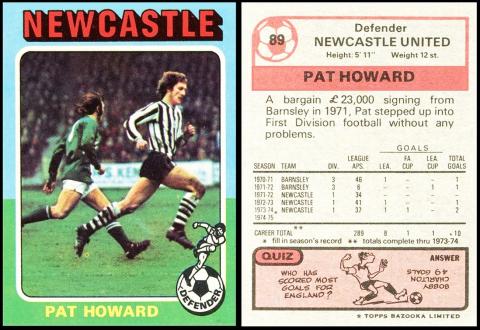
Now though our card shows the type of thick cloth shorts being sported by footballers - even though this is the 1970s, and they are rather skimpy ones - in an underwear context "shorts" are most usually worn by women.
They are larger than briefs, but still not too high across the stomach, and they are one of the most comfortable of all designs.
And you will often find them used, but slightly thicker and more patterned, as the bottom halves of summer pyjamas.
Patrick Howard was born on the 7th of October 1947, in Dodsworth, part of Barnsley, which was his first football team.
He then moved to Newcastle United in 1970/71. During that time he appeared on his first card, a rather odd, blank backed series, that some collectors do not even consider cartophilic. It was issued by Marshall Cavendish publications as part of their "Book of Football", a part work, complete in seventy-five parts. These parts were sold at newsagents for 23p each, or you could be profligate and buy the whole lot, to be delivered to your address also as a partwork, over twelve months, for £13.30, including postage and packaging. Now the first twenty of those parts came with an added bonus, these "Colour Star Portraits", sheets of which formed the centre spread, and were then to be cut out by the recipient, and put in a special album which was included with the second issue, or, if you missed that, bought for 25p, including postage and packaging. Do note that there are only three hundred and twenty cards - a completed album does indeed have three hundred and sixty four portraits, but forty-four of those are actually pre-printed.
Pretty much all the cards ever issued of him show him in that Newcastle strip. This changes in 1977, when he appeared in an orange and red outfit, as part of the Americana "Football Special 1977-1978". These cards are actually stickers, and they have a section where you can peel a shaped part off the front and stick it in the album. The backs that remain have the player`s name on the back, and their team, and our man`s reputedly says Arsenal, though this is quite unlike any Arsenal strip I ever saw. However, Newcastle had indeed sold our man to Arsenal in 1976, though he was soon transferred out, back north, to Birmingham City. Now I checked up on them, but they played in blue. I also checked out the Portland Timbers, to whom, in 1978, Birmingham City loaned him out. They were an American soccer team, based in Oregon, North America, and were founded in 1975, but only lasted until 1982. So if anyone recognises that rather lairy orange attire, and can tie it to a team, please let us know. Or if you have that sticker and can just read off what it says, because even the trading card database does not show the back in the case of our man.
America was either not to our man`s liking, or it was only intended to be a short loan. He lasted out the year with them, but was back in England, with Bury, for the 1979 season, and it is not their strip either.
He retired in 1982, and presumably is still alive, though I can find nothing else about him.
This set currently only appears in our original British Trade Index part three, as :
- FOOTBALLERS - 1975. (A). 89 x 63. Back "Topps Bazooka Limited". Latest dating on backs is "Season 1974-75". ... TOH-3
1. English edition. Back in red. Nd. (220)
2. Scottish edition. Back in blue. Nd. (88)
This is not actually correct as the English edition was of two series.
The first of these was numbers 1 to 132, including a sub-series called "Double Centurions" (cards 64 to 68 - Ron Davies, Ken Wagstaff, Kevin Hector, Francis Lea, Geoff Hurst).
Whilst the second series being of eighty-eight cards, numbered 133 to 220, and including a sub-series called "Great Britain Select Eleven" (cards 190 to 201 - which unfortunately starts with a typo, "Mike" Channon, not Mick, then continues through Malcolm MacDonald, Leighton James, Colin Todd, David Nish, Emlyn Hughes, Phil Thompson, Billy Bremner, Colin Bell, Alan Hudson, Peter Shilton, and Paul Madeley).
